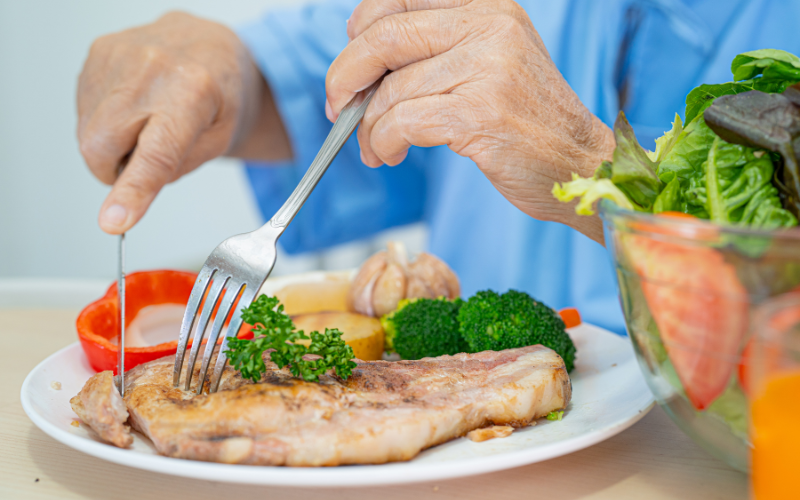
Nutrition plays a major role in healthy aging. Eating a low-carbohydrate diet rich in fruits, vegetables, and seafood is shown to reduce certain diseases, prevent obesity, and protect the brain from aging. Seniors are urged to modify their diet to include nutritious options.
The natural aging process causes several biological changes that are largely out of an older adult’s control. As a result, seniors tend to experience a decrease in their quality of life. But certain factors are controllable, such as diet, which can enhance overall quality of life.
What is the importance of nutrition?
Eating nutritiously simply means choosing foods that give the body the fuel and liquids it needs to function optimally. The aging body relies heavily on nutrients found in food, such as vitamins, minerals, protein, fats, carbohydrates, and liquids, such as water.
By consuming a healthy diet, seniors benefit immensely. Older people are better able to maintain a healthy weight by making smart food choices. Good nutrition can also prevent certain diseases, such as high blood pressure, osteoporosis, heart disease, type 2 diabetes, and some cancers.
How does aging affect nutrition?
Aging changes not only the physical body but the amount of food seniors need to stay healthy. For example, some elderly individuals need to eat more protein, while others benefit from consuming fewer calories. Regardless, all seniors still need to eat enough nutrients.
Seniors may need fewer calories because they are less physically active than in their youth. Age-related loss of muscle mass or bone can also decrease an older person’s need for calories. Changes in metabolism likewise lower the number of daily calories that a senior needs.
Eating healthily may become more challenging as seniors age. Health conditions, like arthritis or tiredness, can make it harder for them to open jars or stand over the stove to cook for themselves. Memory problems due to dementia may cause seniors to forget how to prepare meals.
Appetite is reduced by some medications. Seniors who take prescription drugs may experience dry mouth, which makes it harder to enjoy food. When older adults lose their sense of taste or smell, it also prevents them from fully savoring a meal and benefitting from its nutrients.
Furthermore, aging people may find themselves living alone and losing interest in the joy of eating their meals. Especially when these seniors live with mobility issues, buying fresh fruits and vegetables and preparing them become obstacles to consuming essential nutrients.
How do seniors eat nutritiously?
1. Eat More Protein
Due to age-related issues like these, every bite counts. Protein, for instance, should be consumed in adequate quantities to prevent the loss of lean muscle mass—especially in people aged 71 and older. A variety of everyday foods are rich in protein and should be served to seniors.
Seniors normally consume sufficient amounts of meat, poultry, and eggs. But the elderly should be aware of other protein-rich sources, such as seafood, dairy, and fortified soy alternatives. Peas, beans and lentils are excellent sources of protein and contain additional nutrients, like vitamin B12 and calcium.
2. Consume Healthy Carbs
Carbohydrates are also a part of a healthy diet. Whole grains, fruits, and vegetables deliver energy and lower the senior’s chances of developing heart disease, diabetes, and cancer. Besides whole wheat bread, good options include quinoa, wheat berries, and whole-wheat couscous.
3. Limit Sugars
Seniors are urged to consume less foods that contain little nutrition, like sugar. Indulging in excess sugar contributes to a range of health issues that decrease quality of life. Eating too much sugar disrupts blood sugar regulation and is a risk factor for developing type 2 diabetes.
A diet high in sugar impacts cognitive function, too. Memory and learning difficulties arise, which accelerate age-related cognitive decline. Intent on eating sugary foods, seniors crowd out opportunities to consume nutrient-rich foods. Chronic inflammation is also linked to a high-sugar diet.
4. Drink Plenty of Water
As seniors age, their sense of thirst naturally fades and their body’s water content decreases. Yet the aging body still needs fluids to function. Water is essential for cushioning the joints and controlling body temperature; it also affects focus and mood. Seniors should drink eight glasses of water daily.
How do seniors overcome the challenges of eating well?
No matter what their age, the elderly should consume the recommended amount of nutrients. Seniors who have trouble eating nutritiously can obtain support. If cooking is challenging, a physical therapist can teach the senior ways to make it easier. Or a caregiver can prepare healthy meals.
Older adults who experience difficulty chewing due to dental issues are advised to see a dentist for treatment. When swallowing food is problematic, try drinking more water during the meal; or check with a doctor, as a medication side effect may be the cause of the issue.
Elderly Care from Assisting Hands

Eating alone may discourage some seniors from consuming enough healthy foods. In such cases, an in-home caregiver from Assisting Hands Home Care is available to socialize with the senior during mealtimes to encourage eating and make the dining experience enjoyable.
In addition to socialization and companionship, caregivers from our reputable home care agency provide other services that allow the elderly to live independently. We shop for fresh groceries, like fruits and vegetables, and prepare balanced meals. Caregivers serve beverages to ensure hydration.
We provide timely medication reminders, perform light housekeeping and conduct fall risk assessments. If your aging loved one has a doctor’s appointment, we transport them safely and provide escort to promote confidence. Caregivers also help with hygiene tasks, like bathing, toileting, and dressing.
Elder home care is customizable and flexible. We offer a range of non-medical care services, including compassionate Alzheimer’s and dementia care, after-surgery care, respite care, and around-the-clock care in Frisco, TX | Plano, TX | Allen, TX | Little Elm, TX | Prosper, TX. All of our services are provided in the comfort and familiarity of the senior’s home.
Seniors who choose Assisting Hands Home Care, not only eat nutritiously but enjoy a better quality of life. Our professionals are licensed, bonded, and insured to give families greater peace of mind. Call us at (214) 609-1340 to schedule a free in-home consult today and see how senior care is beneficial.







